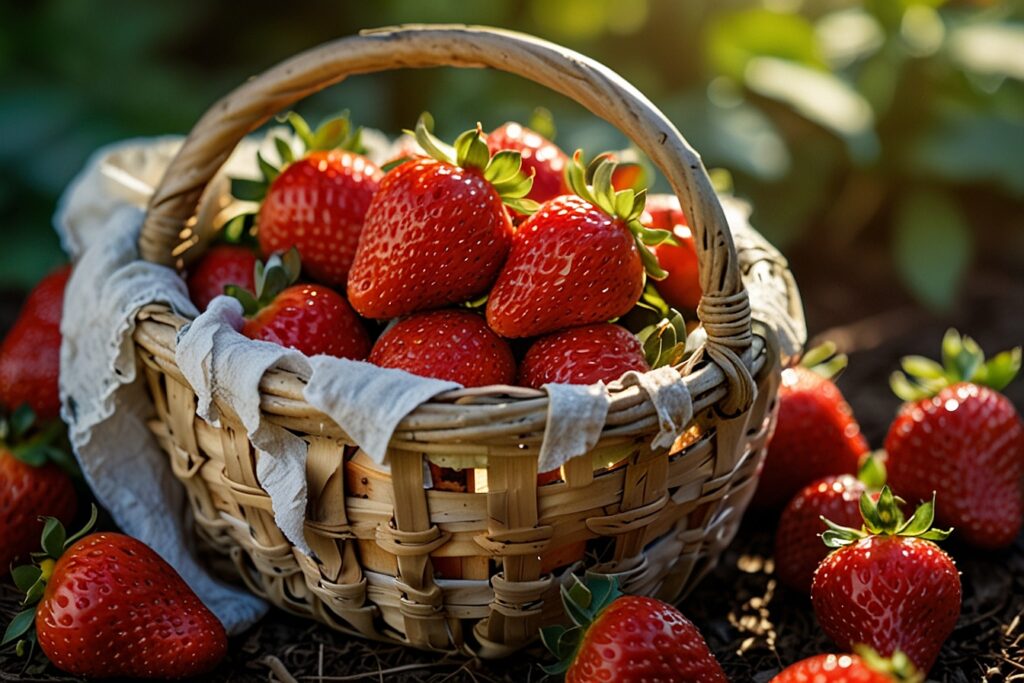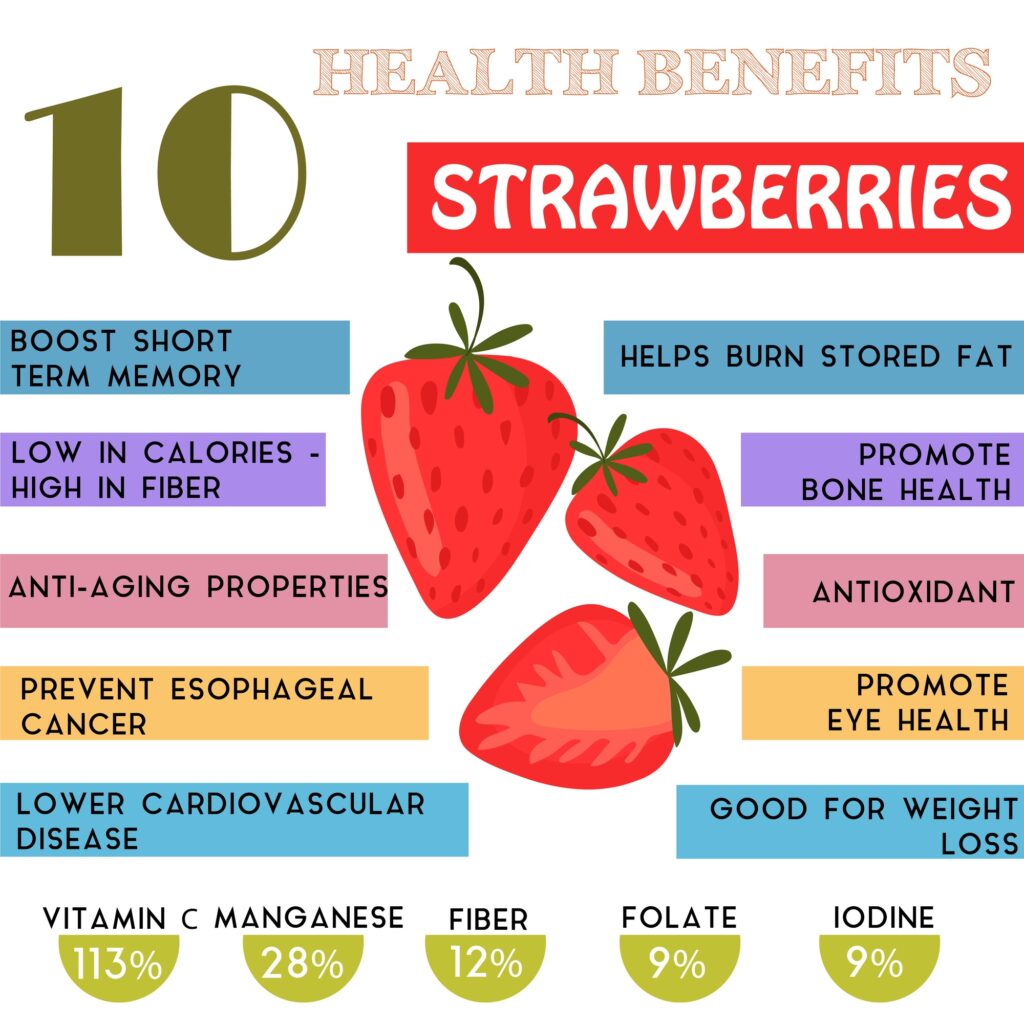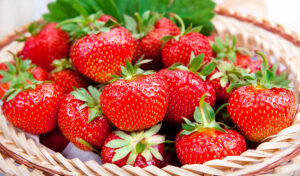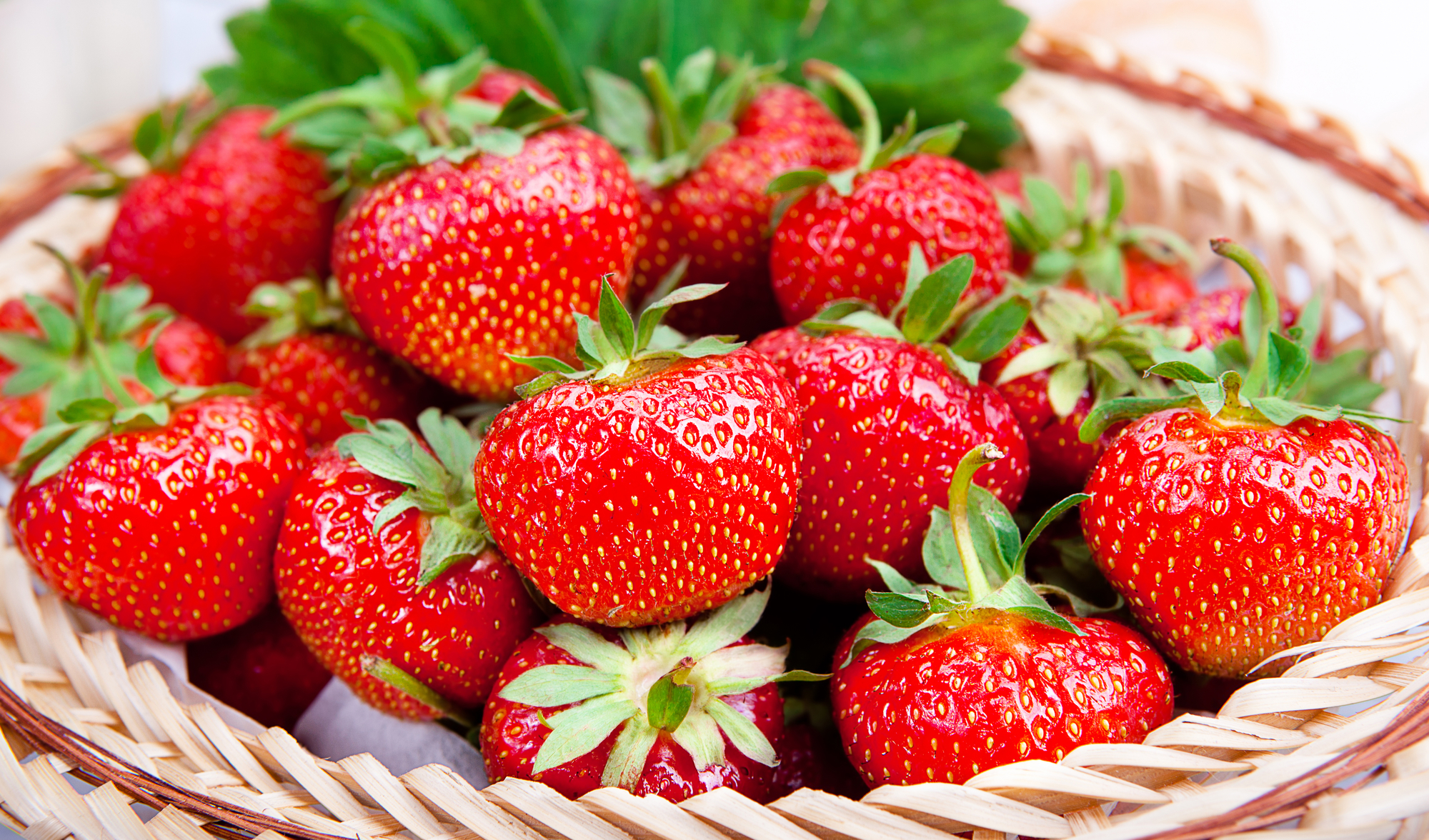Imagine savoring a sun-kissed ripe strawberry. Its sweet fragrance engulfing you with juice trickling down your chin. Now envision that strawberry, free from harmful chemicals, and bursting with extra nutrients. Welcome to the realm of strawberries, where flavor harmonizes with health and eco practices.
Lately, organic strawberries have been in the spotlight at grocery stores for many reasons. These vibrant fruits aren’t just a delight for your taste buds; they’re also packed with nutrition and embody sustainable agricultural methods..
What sets strawberries apart and why should you think about swapping out conventional ones?

Decoding Organic Strawberries
Organic farming is akin to letting Mother Nature lead the way. It’s a cultivation approach that collaborates with nature of working against it. When it comes to strawberries, this translates to;
- No pesticides or weed killers
- No fertilizers
- Emphasis on nurturing soil health and biodiversity
The certification process, for organic produce is thorough, guaranteeing that only genuinely organic strawberries reach your table.
Organic strawberry fields need to be free from chemicals for a minimum of three years. Farmers are required to maintain records and undergo yearly inspections.
Advocating for Organic Strawberries
Health Benefits
- Reduced exposure to pesticides
- increase in antioxidants
- Berries with higher mineral content thanks to nutrient rich soil
Environmental Advantages
- Healthier soil ecosystems
- Enhanced biodiversity
- Improved water quality by minimizing chemical runoff
Considering Taste
Many people notice that organic strawberries offer a more intricate and intense flavor due to their slower growth rate and emphasis on soil health.
Comparison: Conventional vs. Organic Strawberry Farming
Conventional strawberries are typically treated with around 60 pesticides, some of which are recognized as carcinogens, endocrine disruptors and neurotoxins. This not only impacts the berries, but also has wider implications;
Environmental Impact
Contamination of soil and water
Adverse effects on beneficial insects including pollinators
Worker Safety
High exposure to pesticides for farmworkers
Organic farms offer a safer working environment
Long Term Considerations
Although organic strawberries may have higher initial costs, it’s important to think about the hidden expenses associated with conventional farming practices, such as healthcare expenses related to pesticide exposure and environmental remediation efforts.
Insider Tips on Growing Organic Strawberries
Organic Strawberry Fertilization
Essential components for a rounded fertilization approach:
- Matured compost
- Balanced organic NPK fertilizers
- Utilize worm castings
Recommended fertilization schedule
For June-bearing strawberries: Apply in spring after harvesting and, in the fall.
For August-bearing strawberries: Apply in spring and every 4-6 weeks during the growing season.
Container-grown strawberries require fertilization and yearly soil replenishment.
Take your strawberry growing to the next level with the AeroGarden Harvest Elite. This hydroponic growing system lets you grow organic strawberries indoors year-round, with automated LED lighting and reminder systems for water and nutrients. Perfect for beginners and experienced gardeners alike.
- INDOOR GARDENING MADE EASY: Enjoy abundant harvests year round with the AeroGarden Harvest Elite 360, an indoor hydroponic gardening system that grows your favorite vegetables, herbs, or flowers in water without the mess of soil
- ROOM FOR 6 PLANTS: This round, stainless steel countertop garden features a spacious grow deck and water bowl so you can grow 6 different live plants at once, all up to 12 inches tall
- HIGH-PERFORMANCE GROW LIGHT: The full spectrum 20W LED grow light with an automatic on/off timer mimics natural sunlight to help plants germinate up to 5x faster than in soil
- FEATURES AND BENEFITS: Our indoor garden’s touch-sensitive illuminated digital display control panel reminds you when to add water and plant food while vacation mode keeps your plants healthy while you're out of town
- WHAT'S INCLUDED: The AeroGarden Harvest Elite 360 comes with a 20W LED grow light system, power adapter, one 3 oz. bottle of liquid plant food, and the Gourmet Herb Seed Pod Kit featuring Genovese Basil, Curly Parsley, Dill, Thyme, Thai Basil, and Mint
Here are some tips, for selecting and storing strawberries:
Selecting the berries
Look for a rich deep red color.
Smaller berries usually pack flavor.
Check for caps on top.
Storage recommendations
It’s best to consume them within a day or two if possible.
If refrigerating, keep them unwashed in a container lined with paper towels.
You can try the vinegar wash method to prolong their shelf life.
For long-term storage, consider freezing them.
The Rubbermaid FreshWorks Produce Saver has revolutionized how I store organic strawberries. Its patented technology regulates the flow of oxygen and carbon dioxide, while the built-in filter helps your precious organic berries stay fresh up to 80% longer. Worth every penny for serious berry lovers.
- Set of 3 includes one 6.3 cup and two 17.3 cup containers with lids
- Save money, food, and trips to the grocery stores
- FreshWorks works best before you wash produce, so you can store now and prep later
- CrispTray helps keep moisture away from produce to reduce spoilage
- FreshVent technology regulates flow of oxygen and carbon dioxide for the ideal produce environment; Vent filter never needs to be replaced
Washing and prepping
Wash the berries right before you eat them.
Rinse under water.
Only hull them when necessary.
Incorporating strawberries into your meals
Ideas for eating fresh
Try topping Greek yogurt with sliced strawberries, honey and chia seeds.
Make a strawberry caprese salad with mozzarella and basil.
Create berry bruschetta with ricotta and black pepper.
Baking
Experiment with dishes like strawberry balsamic chicken, berry bliss muffins or grilled strawberry kebabs.
Preservation methods
Consider making a small batch of chia seed jam or dehydrated strawberry slices. You can also freeze strawberry cubes for use.
When organic isn’t an option
Refer to the Clean Fifteen and Dirty Dozen lists to prioritize your purchases. Strawberries often rank high on the Dirty Dozen list due to pesticide residues.
Alternative choices
- Organic strawberries that’re frozen
- Choices include pesticide options (though not officially certified organic)
- Visit pick your own farms for strawberries
- Grow your own strawberries
- Explore different types of berries as substitutes
- Eat fruits in accordance with their availability

Tips for shopping
- Carefully read and understand product labels
- Thoroughly wash conventionally grown berries before consumption
- Remove the tops of conventionally grown berries to minimize exposure to pesticides
- Give priority to organic options for foods consumed
Embracing the Organic Strawberry Lifestyle
Opting for organic strawberries goes beyond personal health – it signifies a choice in favor of a more sustainable food system. Each purchase of strawberries supports farmers who prioritize responsibility and worker well-being. This small decision has reaching effects.
As you delve deeper into the world of strawberries, remember that perfection is not the goal. Whether you’re tending to your strawberry patch, selecting the berries at the market or finding creative alternatives when organics are scarce, you are contributing to a broader movement promoting healthier eating habits and sustainable farming practices.
Challenge yourself to incorporate strawberries into your daily meals. Experiment with recipes, share your successes with loved ones and don’t shy away from getting your hands dirty in cultivating these delicious fruits. Every little effort makes a difference.
The GARDEN GURU Premium Soil Testing Kit has been a game-changer for my organic strawberry garden. This professional-grade soil tester measures pH, moisture, and nutrients, helping you create the perfect growing environment for your organic strawberries. Includes detailed guides for optimal growing conditions.
The VIVOSUN pH and TDS Meter Combo has become my must-have tool for organic strawberry growing. This professional-grade 3-in-1 meter measures pH, TDS (Total Dissolved Solids), and temperature, ensuring your strawberries get the perfect growing conditions. The digital display and auto-calibration feature make it simple to maintain optimal soil conditions for the sweetest, healthiest organic berries.
- 4-in-1 Mode: With Vivosun 4-in-1 PH tester, you can accurately measure PH, TDS, EC and Temp value; Know water quality clearly to ensure your family members' health
- High Accuracy: With high sensitive probe, you can quickly read the results; Wide measurement range and high resolution guarantee that you can measure different kinds of liquids
- Automatic Temperature Compensation: With ATC function, Vivosun 4-in-1 pH meter solve the inaccurate measuring problem caused by the change of liquid temperature; Easy to get a reliable, stable reading
- Easy to Use: After calibration, put the sensor into the solution you want to test, and get the data immediately; Before another testing, wash the probe carefully; Or you may get a inaccurate reading
- Wide Application: Ideal for household and laboratory testing applications; Buy one for drinking water, beer, kombucha testing; Good for aquariums and hydroponics using, too
Let’s take action
- Opt for organic strawberries next time you go shopping
- Give growing your strawberries a shot in a small pot
- Spread the word about organic strawberries with others
- Show your support for farmers whenever you can
Remember, the path to a healthier more sustainable lifestyle is ongoing. Let organic strawberries serve as a reminder of the changes we can make in our diets and our world.
Here’s to a future brimming with plump strawberries – may your life be as sweet and nourishing, as these exceptional little fruits!

*We may earn a commission for purchases made using our links. Please see our disclosure to learn more.






